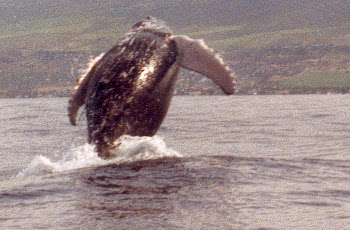This blog may help people explore some of the 'hidden' issues involved in certain media treatments of environmental and scientific issues. Using personal digital images, it's also intended to emphasise seasonal (and other) changes in natural history of the Swansea (South Wales) area. The material should help participants in field-based modules and people generally interested in the natural world. The views are wholly those of the author.
Wednesday, 1 March 2023
Whale of a Time?
Whale Tread-water or Trap feeding was only scientifically described in the 2010's. To use this technique, the whale comes to the water surface and waits, jaws open, at right-angles. Fish shoals then swim to the apparent shelter of the whale's mouth. The whale then eats the lot. This feeding technique has been documented in Bryde's whale (Gulf of Thailand) and Humpbacks (off Vancouver Island). A Flinders University Marine Archeologist now thinks that people were aware of this behaviour up to 2000 years ago (https://www.theguardian.com/environment/2023/mar/01/ancient-texts-power-new-light-shed-on-mysterious-whale-behaviour-that-captured-imagination). Dr John McCarthy sees parallels with old Norse tales of the hafgula. The hafgula was a monstrous 'fish-like' creature that enticed smaller fish into its mouth, before eating them. As early as 150-200 CE, Greek writings in Physiologus (The Naturalist), also described a sea-monster feeding in a similar way. Old Norse and ancient Greek folk, didn't, in those times, actually know what a whale was. McCarthy thinks, however, that observing Tread-water or Trap feeding by Cetaceans, probably generated their stories of sea-monsters.
Subscribe to:
Post Comments (Atom)
-
I n the UK and US, a pparently popular and successful vegan/vegetarian restaurants are reportedly closing or adding meat to their menus ( ...
-
Early ripening fruit may seem convenient but some folk think it confirms environmental stress. There's also a possibility th...


%20mating%20NWCW.jpg)


No comments:
Post a Comment